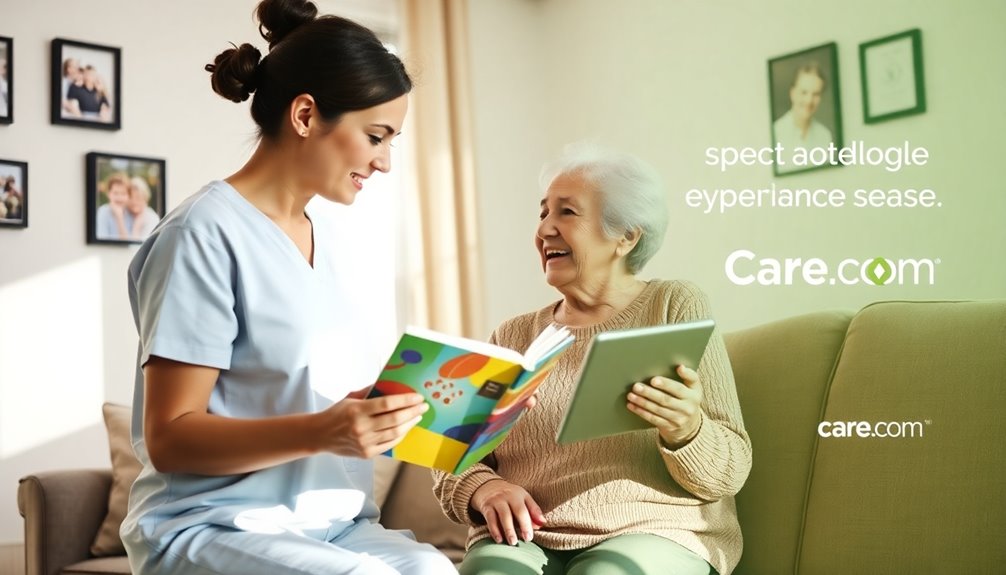To become a caregiver, assess your compatibility with caregiving roles, and explore the different types like home health aides or nursing assistants. You'll need to obtain necessary training and certifications, such as CPR. Gaining practical experience, like volunteering, can help you stand out. Familiarize yourself with legal and ethical considerations to guarantee client safety. To find caregiver jobs, check platforms like Care.com, and you'll discover useful tips for connecting with families and enhancing your profile.
Key Takeaways
- Assess your empathy, communication skills, and personal experiences to determine your fit for caregiving roles.
- Complete necessary training and certifications, such as CNA or HHA programs, to enhance your qualifications.
- Understand legal and ethical requirements, including background checks and HIPAA compliance, to ensure client privacy.
- Create a compelling caregiver profile on Care.Com that highlights your skills, experience, and relevant certifications.
- Set competitive rates based on local market standards and communicate them clearly in your profile to attract families.
Assessing Your Compatibility as a Caregiver

How do you know if you're cut out to be a caregiver? Start by evaluating your empathy and communication skills.
Caregiving requires genuine compassion and the ability to connect with clients on a personal level. If you've had personal experience caring for a family member, you likely understand the importance of adapting to changing needs. This background can enhance your ability to respond effectively to different situations.
You should also enjoy helping others and find fulfillment in making a positive impact on their lives. Being patient and willing to accommodate your clients' evolving preferences is essential.
If you possess these traits, you're well on your way to determining your compatibility as a caregiver.
Understanding Different Types of Caregiving Roles

As you explore the world of caregiving, you'll find that various roles cater to different needs and skills. Caregivers can provide essential services like personal care assistance, medication reminders, and meal preparation.
For example, Certified Home Health Aides (HHAs) focus on companionship and medication administration, while Certified Nursing Assistants (CNAs) offer more extensive medical support. Companion caregivers, requiring less formal training, play a crucial role by providing non-medical support and fostering relationships.
Additionally, specialized care in areas like dementia care can enhance your skills and improve the quality of care you deliver. Understanding these roles helps you identify where your strengths and interests align, ensuring you make a meaningful impact in the lives of those you care for.
Training and Certification Requirements for Caregivers

To become a caregiver, you'll need to explore various certification types like HSW, PSW, and CCA, each requiring state-approved training.
You'll also find different training program options tailored to the specific role you want to pursue.
Plus, ongoing education is key to keeping your skills sharp and staying updated in this rewarding field.
Certification Types Overview
Steering the world of caregiving requires an understanding of various certification options that align with your career aspirations and local regulations. You can pursue certifications like Home Support Worker (HSW), Personal Support Worker (PSW), or Continuing Care Assistant (CCA), depending on your goals.
Certified Home Health Aides (HHAs) typically complete training programs focused on medication administration and personal care, while Certified Nursing Assistants (CNAs) undergo more extensive training, including clinical practice.
It's also wise to get CPR and first aid certifications, as these may be required. Keep in mind that background checks are standard for many caregiving roles to guarantee safety and trustworthiness.
Continuous education in specialized areas, like dementia care, can further enhance your skills.
Training Program Options
Choosing the right training program is essential for your journey as a caregiver. You can pursue certifications through state-approved programs for Home Health Aides (HHA) or Certified Nursing Assistants (CNA). HHA programs typically require less training than CNA programs, making them a good starting point.
It's also beneficial to obtain certifications like CPR and first aid, which enhance your emergency response skills. Specialized training in areas such as dementia care or assistive devices can boost your competency and attractiveness to employers.
Additionally, engaging in continuous education helps you stay updated on best practices and emerging healthcare trends. Volunteering at nursing homes or senior centers offers hands-on experience that can be a valuable asset when pursuing formal caregiver roles or certifications.
Ongoing Education Importance
While the role of a caregiver can be rewarding, ongoing education is crucial for success and growth in this field. Pursuing certifications like Home Support Worker (HSW), Personal Support Worker (PSW), or Continuing Care Assistant (CCA) enhances your qualifications and boosts your employability.
Basic first aid training and CPR certification are also essential, equipping you with critical skills for emergencies. Continuous education in specialized areas, such as dementia care, helps improve your competence and confidence.
Many states even require caregivers, especially Certified Nursing Assistants (CNAs) and Home Health Aides (HHAs), to complete approved training programs and pass competency exams. Regular participation in ongoing training and workshops guarantees you stay updated on best practices and evolving client needs in healthcare.
Gaining Practical Experience in Caregiving

Gaining practical experience in caregiving is essential for building the skills and confidence needed in this rewarding field. Start by enrolling in state-approved Certified Nursing Assistant (CNA) or Home Health Aide (HHA) programs, which provide vital training and often include job placements.
Volunteering at nursing homes or senior centers allows you to gain hands-on experience while developing interpersonal skills as you support seniors and individuals with disabilities.
Research different caregiver roles to set realistic expectations about responsibilities and necessary skills, guiding your training and experience. Networking with caregiving agencies can lead to mentorship opportunities and potential job placements.
Finally, completing relevant certifications, like CPR and specialized dementia care, enhances your qualifications and makes you more attractive to potential employers.
Legal and Ethical Considerations in Caregiving

As a caregiver, you need to understand the legal requirements like passing background checks to guarantee client safety.
You also have to comply with HIPAA regulations, which protect your clients' privacy.
Being aware of these legal and ethical considerations is essential for providing quality care.
Background Check Requirements
To guarantee the safety and well-being of clients, caregivers must navigate several vital background check requirements.
These checks confirm that caregivers are trustworthy and suitable for working with vulnerable populations. Here are the key requirements you'll likely encounter:
- Criminal Background Check: You'll need to pass a state-approved criminal background check to confirm your eligibility.
- DMV Check: If you're driving clients, a DMV check is necessary to verify your driving history.
- Drug Testing: Many employers require drug testing to maintain a safe environment for clients.
Being background checked not only protects clients but also upholds the ethical standards expected of caregivers.
Understanding and adhering to these requirements is essential for building trust and guaranteeing a safe caregiving experience.
HIPAA Privacy Regulations
Steering through HIPAA privacy regulations is essential for anyone working in caregiving. As a caregiver, you're legally obligated to protect your client's privacy and maintain confidentiality.
Unauthorized sharing of personal health information can lead to legal penalties, so it's vital to understand these regulations. Before disclosing any health information to third parties, including family members, you must obtain written consent from your clients.
Additionally, you should be trained to recognize and report potential breaches of HIPAA regulations, ensuring any suspected abuse or neglect is reported per state laws.
Remember, violations can result in hefty fines, ranging from $100 to $50,000, depending on the severity and intent behind the breach.
Prioritize your clients' privacy to stay compliant.
Finding Caregiver Opportunities on Care.com

Finding caregiver opportunities on Care.com can be a straightforward process, especially since the platform offers a variety of options tailored to your skills and preferences.
Here's how you can get started:
- Create a profile: Highlight your experience, passion, and skills to attract families looking for caregivers.
- Search job posts: Browse thousands of local job posts for child care, senior care, housekeeping, and more, ensuring you find the perfect fit.
- Set your rates: Determine your earnings by setting your own rates, allowing for flexibility in your work schedule.
With both Basic and Premium Membership options, you can choose how to optimize your job search and access valuable features.
Embrace these steps to connect with the right caregiver opportunities on Care.com!
Frequently Asked Questions
How Do Caregivers Get Paid on Care Com?
Caregivers on Care.com get paid through a secure payment system that directly deposits funds into your bank account after you complete a job.
You can set your own hourly rates, typically ranging from $14 to $25, and negotiate them with families based on their needs.
Plus, you might receive tips for specialized services like overnight shifts.
This flexibility allows you to earn what you believe your skills and time are worth.
How Much Do Family Members Get Paid for Caregiving?
Family members providing care typically earn between $14 to $25 per hour, depending on the care needs and location.
You might also explore financial assistance programs in your state, which can help cover costs.
If you formalize your caregiving arrangement with an agreement outlining the scope of care and compensation, it'll clarify expectations.
Some families negotiate rates directly to suit their unique situations, allowing for flexibility in payment structures.
How Much Does Care Com Cost for Caregivers?
So, you wanna plunge into the world of caregiving, huh?
Well, let's talk dollars! Care.com's got a Basic Membership where you can search for jobs for free—how generous!
But if you wanna chat with families or show off your sparkling personality, you'll need the Premium Membership, which costs $12.95 a month if you're frugal.
Want a background check? That's extra!
It's like a deal at a fancy store—so many options, so little money!
How Much Do Most Caregivers Make per Hour?
Most caregivers make between $14 to $25 per hour, depending on factors like location and experience.
If you're working nights or weekends, you might earn even more due to higher demand.
In 2024, the average cost for senior in-home care is expected to range from $31 to $34 per hour.
With plenty of job opportunities in this field, you can enjoy job security and the potential for higher earnings as you gain experience.
Conclusion
Becoming a caregiver is a rewarding journey that requires self-assessment, training, and hands-on experience. With over 34 million Americans providing unpaid care to adults, your role can make a significant impact in someone's life. By understanding the various caregiving roles and fulfilling necessary requirements, you can find opportunities on platforms like Care.com. Embrace this chance to help others while developing a fulfilling career that reflects your compassion and dedication. Start your caregiving journey today!









